- Home
- Jim Eldridge
Murder at the Natural History Museum Page 3
Murder at the Natural History Museum Read online
Page 3
‘And your mother?’ asked Abigail.
Daniel paused, before saying: ‘She died when I was nine. In the workhouse where we went after my father died because she couldn’t support us. The workhouse is still there, in St Pancras Way, not far from where we are now. I left there when I was twelve.’ He fell silent, contemplative, then added: ‘I had a brother and a sister. My brother was older than me, my sister younger. They both died. Typhus. The scourge of the poor. I sometimes wonder why I survived and they didn’t. Luck, I suppose.’ He looked at her. ‘So, that’s it. A workhouse boy. No family of any sort. Except you.’
‘Oh, my poor Daniel,’ said Abigail, and she left her seat to sit down next to him, then pulled him tightly close to her.
CHAPTER FOUR
Daniel and Abigail arrived at the museum at eight o’clock the next morning to find a woman wearing an apron, her hair tied back in a turban made from a scarf, mopping the front steps.
‘It ain’t open to the public yet,’ she told them. ‘Doors open at half past nine.’
‘We’re here to see Mrs Ada Watson,’ Daniel told her. ‘Mr Sharp made the arrangement for this morning at this hour.’
The woman stopped mopping and looked at them doubtfully.
‘I dunno about that,’ she said. ‘No one said nuffin to me about no arrangement.’
‘Perhaps you’d tell Mrs Watson we’re here,’ said Abigail. ‘Mr Daniel Wilson and Miss Abigail Fenton.’
The woman regarded them suspiciously, then said, ‘Wait here. And don’t touch my mop.’
She leant the mop against a wall, then disappeared in through the large double doors.
‘Do I look like the sort of person who’d steal someone’s mop?’ asked Daniel.
‘Perhaps she was referring to me.’ Abigail smiled.
Daniel looked her up and down, then shook his head. ‘No,’ he said. ‘I can’t see you with a mop.’
Abigail looked at him, offended.
‘I’ll have you know that since I moved into your house I have done just as much of the cleaning as you have. More so, in fact. Just because I do it when you’re out and can’t get in my way …’
‘Yes, I’m sorry,’ said Daniel, apologetically.
Abigail was about to expand her protest, when the door opened and the mop lady reappeared, accompanied by a woman in her forties, similarly attired in an apron and with her hair turbaned.
‘Mr Wilson and Miss Fenton?’ she asked.
Abigail and Daniel nodded.
‘I’m Mrs Watson,’ she said. ‘Come in.’
‘I thought it best to check, Ada,’ said the mop lady. ‘Especially after what’s occurred. You can’t trust anyone these days, even the posh-looking ones.’
As Daniel and Abigail followed Ada Watson into the museum, Daniel whispered: ‘I’ve never been described as posh before.’
‘What makes you think she was referring to you?’ whispered back Abigail.
Ada Watson stopped by the reception desk just inside the body of the museum.
‘You’ll have to excuse Evie,’ she said. ‘What’s happened has upset everyone. Mr Sharp said Miss Scott has hired you to find out who done it. Smashed the skeleton.’
‘That’s right,’ said Abigail. ‘We’d like to talk to the people who first discovered the damage.’
‘That was the three of them: Marge Adams, Dolly Tilly and Dolly’s daughter, Tess. How it works is the three of them go into the Grand Hall and do a bit, then Dolly and Tess head off and do the smaller room off the Grand Hall, then come back in and help Marge finish off, before they go and do the conveniences.’
‘Would it be possible to talk to them now?’ asked Abigail.
‘I’ll go and get ’em,’ said Ada.
‘Could we talk to them where the skeleton was found?’ asked Daniel.
She nodded. ‘Wait for us there,’ she said, and headed towards a set of steps leading down.
Daniel and Abigail went to where they’d seen the broken iguanodon skeleton the day before. The damage had been cleared away, leaving a vacant space amongst the other exhibits.
‘At least there’s been no repeat of the attack,’ said Abigail.
‘Fortunately. If Mr Petter was involved in some way, maybe our visit to him has made him cautious,’ added Daniel.
‘If,’ stressed Abigail.
‘There’s definitely something dubious about him,’ said Daniel.
‘Your policeman’s nose?’ asked Abigail.
‘Exactly,’ said Daniel.
Ada Watson reappeared, accompanied by three women, a short, round woman in her fifties, a thin stick of a woman in her forties and an equally thin young woman in her early twenties. The last two looked similar enough to be Dolly and Tess Tilly, which meant the short one was Marge Adams. All three wore the uniform of patterned aprons and turbans for their hair.
Ada introduced them. ‘These are Mr Wilson and Miss Fenton. They’re the detectives Miss Scott has hired.’
Tess Tilly regarded Abigail with a look of wonder.
‘You’re a detective?’ she asked in amazement.
‘I am,’ said Abigail. ‘Along with Mr Wilson.’
‘But you’re a woman,’ said Tess.
‘Nuff of that, Tess,’ rebuked her mother. ‘Don’t be rude.’
‘I wasn’t being rude,’ defended Tess. ‘I was just saying …’
‘Stick to why they’re here,’ Ada ordered, her tone firm. ‘The skeleton.’
‘Yes,’ said Marge. ‘That was just how it was. We walked in and saw it. At first, we thought it must have just fallen over, but then we saw some of the bones were broken, like they’d been hit with something heavy.’
‘Then we saw the piece of cardboard tied to it with words on.’
‘“Because of he that betrayeth”,’ said Ada dramatically.
‘Ada can read,’ said Marge with admiration.
Abigail let Daniel ask most of the questions of the three women, appreciating his long experience as a police officer conducting investigations, but it soon became obvious that the cleaners couldn’t add much to what was already known. They’d discovered the wreckage soon after they’d arrived for work at six o’clock. They’d immediately reported it to Ada Watson, who told them to leave things exactly as they were for the police to examine the damage.
‘It was Mr Sharp who arranged for the screens to be put round it to hide it from the public’s eyes,’ Ada told them. ‘Otherwise they’d have had to close off the whole Grand Hall, and they couldn’t do that.’
‘Did you notice any particular marks on the floor near the damage?’ asked Daniel. ‘Boot marks, for example?’
Ada looked at the other three, who shook their heads.
‘No,’ said Marge. ‘Whoever did it had clean shoes, otherwise we’d have noticed it, being cleaners as we are. We spot things like that.’
‘Ah, Miss Fenton and Mr Wilson.’ They turned to see Miss Scott advancing towards them. ‘Here I am, early, as promised. Have Mrs Watson and the others been of assistance?’
‘Indeed, Miss Scott, they have,’ said Daniel. He turned and smiled at the four cleaners. ‘Thank you, ladies. And if we have any other questions we’ll talk again.’
CHAPTER FIVE
As Daniel and Abigail followed Scott up the stairs that led to her office, the curator murmured in a low voice: ‘I gather they weren’t able to help very much.’
‘Not really,’ admitted Daniel. ‘But they were all very conscientious about trying to.’
Once inside Scott’s office, the curator handed them a paper folder.
‘These are the copies of the letters regarding the exhibition. None of them are from or to the Bone Company, although they are on a list of fossil suppliers that Mr Hardwicke wrote out when the exhibition was being planned. The only letters recorded are those between the Fundamental Fossil Company, based in Boston, who acted as our agents in dealing with American fossil suppliers. You will see that the first letters between the museum and the com
pany are when Mr Hardwicke was still here, and the later ones are addressed to, or signed by, me. There is absolutely nothing in our records from Petter and Wardle except the threatening one I showed you yesterday.’
She gestured towards a smaller desk and some chairs near some filing cabinets.
‘Feel free to use that desk while you go through the file. You may find something that I’ve missed.’
‘Thank you,’ said Abigail, taking the file from her.
She and Daniel were just walking towards the desk when there was a rapid knocking on the door. It sprang open and Mrs Smith entered, her face flushed with excitement.
‘They’re here,’ she exclaimed.
Daniel, Abigail and Scott looked at her, puzzled.
‘Who’s here?’ asked Scott.
‘I was just walking in and as I passed the main reception, I saw them talking to the senior attendant. Sir Henry Irving and Ellen Terry. They’re with Mr Stoker. They’ve come to look at the exhibition,’ continued Smith.
Daniel looked at the clock. ‘It’s not yet nine o’clock,’ he said, puzzled.
‘They said they wanted to look at it before the public are allowed in,’ said Mrs Smith. ‘They do get harassed by people, the poor dears. Wanting to shake their hands and so forth.’
‘The drawback of celebrity,’ said Abigail.
‘I trust the senior attendant let them in,’ said Scott.
‘Indeed,’ said Smith. ‘He looks so regal, you know. Sir Henry, that is. And Miss Terry is every bit as beautiful as when she’s on stage.’
‘I shall go and welcome them,’ said Scott, determinedly.
And with that, she swept out, followed by the enrapt Mrs Smith.
Abigail looked at Daniel, quizzically.
‘Are you coming down?’ she asked.
‘To gawp at an actor?’ asked Daniel, indignantly.
‘You are such an inverted snob, Daniel Wilson,’ snapped Abigail.
When Daniel and Abigail arrived in the Grand Hall they saw Miss Scott standing beside the reconstructed skeleton of a stegosaurus, obviously explaining about it to the couple who stood there, gazing at the creature and nodding as they listened. Even though it was the first time Daniel had seen them in the flesh, there was no mistaking them: Sir Henry Irving and Ellen Terry, revered actor and actress, stars of the Lyceum Theatre. Irving was the embodiment of the illustrations of him in the newspapers and magazines: tall, thin, with that famous patrician profile, the hawklike nose and the high cheekbones, and, for a man of almost sixty, a full head of luxuriant silvery hair. Terry, by comparison, was a small, elfin figure who looked nearer to her mid-twenties than someone approaching fifty years of age. With her tiny frame, her delicate features, she was the living form of the Pre-Raphaelite image of the romantic heroine. The other thing that struck Daniel about her was that, despite the puritanical censoriousness of the times, when he and Abigail were viewed by many – including Abigail’s own sister, Bella – as beyond the pale because they were living together but not married (‘in sin’ as Bella put it in condemnation), Terry was revered by all society, including the highest in the land, despite her life being littered with broken marriages and former lovers, with at least two children born out of wedlock.
It struck Daniel that most of the museum’s attendants seemed to have decided to look after the Grand Hall, because – although they kept a respectful distance – they had all appeared and were gazing in wonder at the illustrious pair.
‘I told you Mr Stoker would come through for us,’ murmured a happy voice beside Daniel.
He turned and saw Herbert Sharp.
‘He brought ’em in, Mr Wilson, like he said he would,’ chortled Sharp.
‘Where is he?’ asked Daniel, searching for a sign of this apparently well-known figure of London’s theatreland.
‘I saw him going into the small anteroom off the Grand Hall,’ said Sharp. ‘I’ve got to go and thank him. This is something very special.’
A man of his word, thought Herbert Sharp delightedly as he made for the anteroom. That’s the kind of friend the museum needs.
The room was empty except for Bram Stoker, who was kneeling down beside the skeleton of a small dinosaur. He appeared to be examining a roll of cloth lying on the floor next to the fossil.
‘Everything all right, Mr Stoker?’ called Sharp.
Stoker rose to his feet and turned towards Sharp, a look of distress on his face.
‘No,’ he said. He pointed at the roll of cloth. ‘There’s a dead man here.’
Sharp hurried forward in a state of bewilderment. Dead man? Then he stopped, shocked. A corner of the cloth had been peeled back and Sharp could see the face of Raymond Simpson, one of the museum’s attendants.
‘W-w-what?’ burbled Sharp helplessly. ‘What? How?’ He looked towards Stoker, but the man was already heading in the direction of the Grand Hall.
‘Mr Stoker!’ called Sharp. ‘Wait!’
‘How long are we going to stand here watching this?’ grumbled Daniel.
Irving and Terry had moved on to another skeleton and were listening to Miss Scott describing it with much waving of arms and pointing of fingers, while the museum staff watched awed from a respectful distance.
‘You don’t find it interesting, seeing two of the greatest actors in the world in the flesh?’ asked Abigail.
‘No,’ said Daniel. ‘During my time with Abberline at Scotland Yard I met many so-called famous people and I found the majority of them to be vain, self-obsessed, and expecting everyone to fawn over them and do their bidding.’
‘I think you’re being ungracious,’ said Abigail.
‘Perhaps, but I feel we are wasting precious time which could be spent on the investigation. Instead we are watching people talking to one another, but without being able to hear what they say. It’s like watching a mime show without interesting physical actions.’ Suddenly he was alert. ‘But that may be about to change.’
‘In what way?’ asked Abigail, puzzled.
As they watched, the figure of Bram Stoker appeared and hurried towards Irving, Terry and Scott. He spoke urgently to them, gesturing towards the main entrance. Immediately, Irving and Terry moved away with him.
‘Something’s happened,’ murmured Daniel, and he moved forward, Abigail following closely behind him. As they did so, a middle-aged man appeared, smiling broadly, and stopped in front of Irving and Terry.
‘Sir Henry!’ He beamed. ‘Miss Terry. Allow me to introduce myself. I am Dawson Turner, one of the trustees of the museum …’
‘I’m afraid we have to go,’ said Stoker, curtly. He took Irving and Terry by the arms and hurried them towards the entrance. Turner stared after them, stunned, then turned to Miss Scott.
‘What on earth—?’ he began, before he was interrupted by the shocked voice of Herbert Sharp shouting: ‘Murder!’
Everyone turned and saw the bulky shape of the maintenance manager standing in the doorway to the smaller anteroom, a look of anguish on his face.
‘Murder!’ he shouted again. ‘Raymond Simpson is dead!’
CHAPTER SIX
Daniel led the charge, followed by Abigail and Miss Scott, with the rest of the staff and Dawson Turner close behind. Sharp had returned to the body concealed in the roll of cloth.
‘It’s Raymond Simpson,’ he said, repeating the words as if he couldn’t bring himself to believe it.
He reached down to pull the cloth back more, but Daniel stopped him.
‘Don’t touch anything, Mr Sharp, until the police have been.’
‘Yes.! I must send for the police,’ exclaimed Scott. She turned to one of the watching attendants and said: ‘Mr Wexford, go out and find a cab while I write a note. Then I want you to take it to Scotland Yard.’
As the attendant hurried off, Daniel said to Miss Scott: ‘I would suggest you mark your note for the attention of Inspector John Feather. He’s one of the best detectives there is.’
Daniel stopped Miss Scott as sh
e was about to make for the reception desk, and pen and paper.
‘What did Mr Stoker say that made Sir Henry and Miss Terry rush off like that?’ he asked.
‘He said a man had been found murdered in the anteroom. He said they needed to leave immediately to avoid being caught in a scandal.’
‘He should have stayed,’ said Daniel. ‘The police will need to talk to him.’
‘They’ll know where to find him,’ said Scott. ‘At the Lyceum. Now, I must get this note sent.’
She hurried off, and Herbert Sharp intervened. ‘It was Mr Stoker who found the body,’ he said. ‘I came in and found him kneeling by it.’
Dawson Turner peered at the roll of cloth.
‘There’s something fixed to it,’ he said. ‘Some kind of label.’
‘Careful,’ cautioned Daniel. ‘We need to leave everything as it is for the police.’
Turner bent down. ‘I can see what it says without touching it. “The price of treason”.’ He looked at Daniel, puzzled. ‘What does it mean?’ He then looked quizzically both at Daniel and Abigail. ‘Also, I’m not sure who you are. The museum isn’t officially open yet, and you weren’t with Sir Henry’s party.’
‘Mr Daniel Wilson and Miss Abigail Fenton,’ Daniel introduced them.
‘Of course,’ exclaimed Turner. ‘Miss Scott wrote to the trustees yesterday and said she’d engaged you to look into the damaged skeleton.’ He looked at Abigail with particular remorse. ‘I am especially apologetic in not immediately recognising you, Miss Fenton. I know your work as an archaeologist, of course, and have seen your photograph in magazines. Please forgive me.’
‘No apology is necessary,’ said Abigail. ‘As you say, Mr Turner, the museum isn’t officially open yet, so the question is: who left the body, and when? Was it here when the cleaners were still here?’
‘Surely they would have remarked to someone if it had been,’ said Turner.
‘Not necessarily,’ said Sharp. ‘It was wrapped in cloth. They may have thought it had been left there for some reason, possibly to be displayed later.’

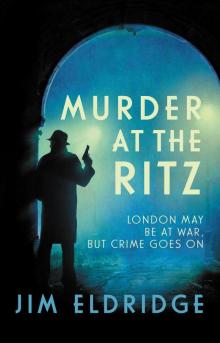 Murder at the Ritz
Murder at the Ritz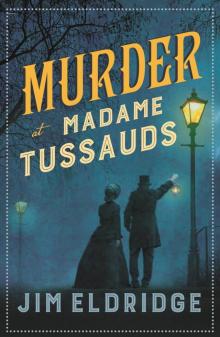 Murder at Madame Tussauds
Murder at Madame Tussauds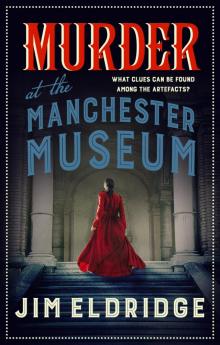 Murder at the Manchester Museum
Murder at the Manchester Museum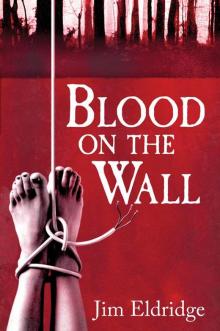 Blood On the Wall
Blood On the Wall 4.3.2.1
4.3.2.1 Jungle Kill (Black Ops)
Jungle Kill (Black Ops)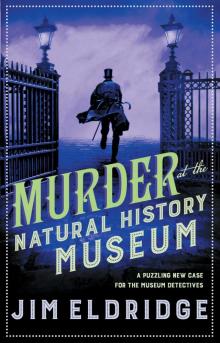 Murder at the Natural History Museum
Murder at the Natural History Museum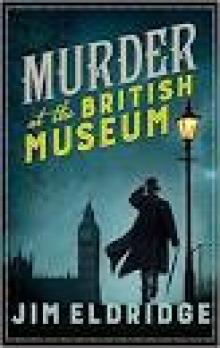 Murder at the British Museum
Murder at the British Museum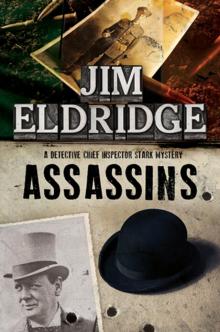 Assassins
Assassins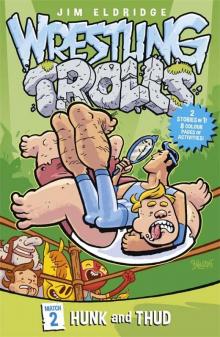 Hunk and Thud
Hunk and Thud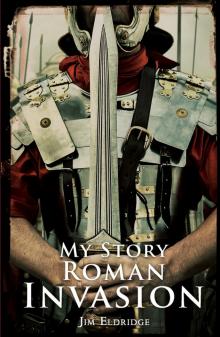 Roman Invasion
Roman Invasion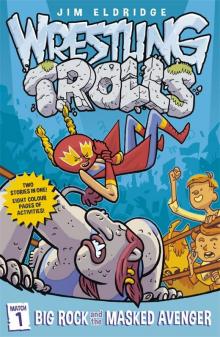 Big Rock and the Masked Avenger
Big Rock and the Masked Avenger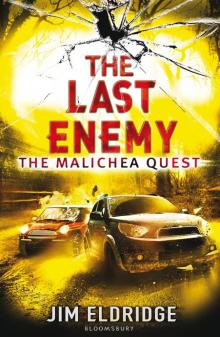 The Last Enemy
The Last Enemy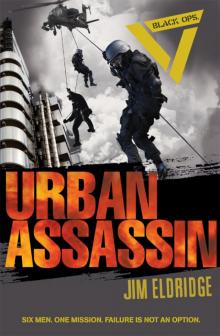 Urban Assassin
Urban Assassin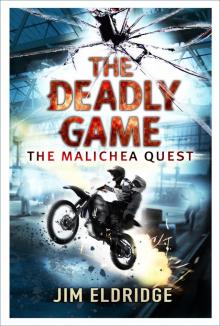 The Deadly Game
The Deadly Game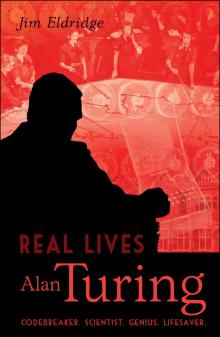 Alan Turing
Alan Turing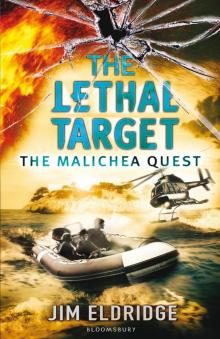 The Lethal Target
The Lethal Target The Giant Rumble
The Giant Rumble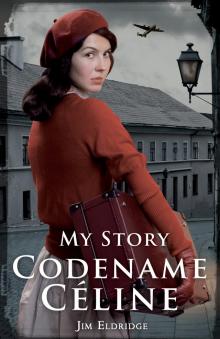 Codename Céline
Codename Céline Death in the Desert
Death in the Desert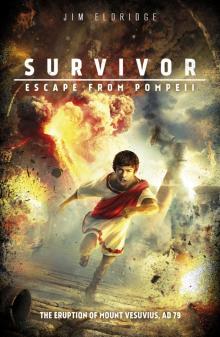 Escape from Pompeii
Escape from Pompeii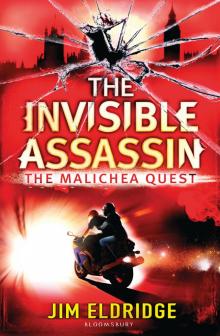 The Invisible Assassin
The Invisible Assassin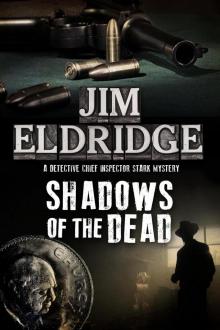 Shadows of the Dead
Shadows of the Dead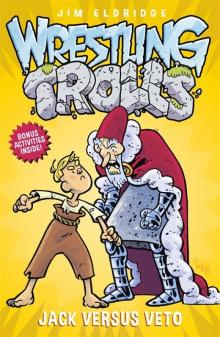 Jack Versus Veto
Jack Versus Veto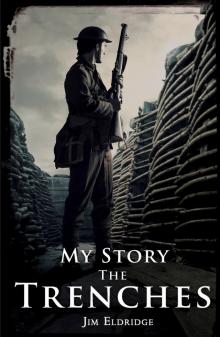 The Trenches
The Trenches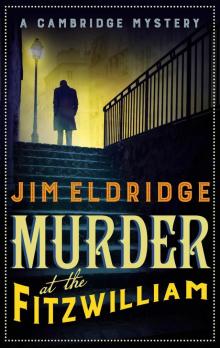 Murder at the Fitzwilliam
Murder at the Fitzwilliam Coming Home
Coming Home